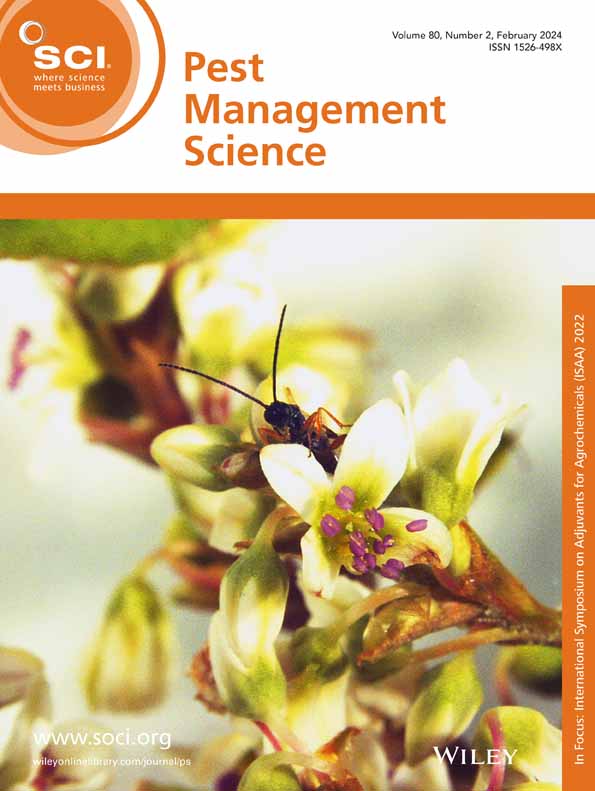在寄主-拟寄主营养系统中,被叶氏赤眼蜂寄生的库氏Ephestia neehniella幼虫的同种卵消耗增强:诱发同类相食转变为捕食逆转
IF 3.8
1区 农林科学
Q1 AGRONOMY
引用次数: 0
摘要
食人行为直接影响食人物种,并可能间接影响其生态相互作用。然而,它对营养相互作用的影响仍未得到充分探索,特别是当食人族食用被寄生的同种虫时,可能导致捕食逆转。结果本研究在昆虫-昆虫模型中研究了寄主卵寄生是否会引起同类相食,从而可能引发捕食逆转,并阻碍生物控制的结果,特别是在拟寄主作为次要消费者和鳞翅目寄主作为主要消费者的情况下。采用无选择实验和双选择实验研究了库氏小蜂(Lepidoptera: Pyralidae)幼虫对未寄生和(或)叶氏赤眼蜂(Trichogramma evanescens)同寄生卵的密度依赖性取食和取向偏好。结果表明,在无选择实验和双选择实验中,库氏埃希氏菌幼虫对被寄生的同种卵表现出明显的摄食和取向偏好。寄主-拟寄主营养水平的捕食逆转表明寄主-拟寄主营养水平的捕食逆转表明寄主-拟寄主营养水平的捕食逆转表明寄主-拟寄主营养水平的捕食逆转表明寄主-拟寄主营养水平的捕食逆转。雏鸟取食被寄生的卵批显著减少了寄生蜂的出现数量。人工破坏的同卵也被新生儿偏爱,这表明对受损的同卵含量有明显的兴趣,而寄生蜂相关线索在感知被寄生卵中的作用仍有待研究。结论探讨了虫卵消费增加的可能原因。本研究强调了寄生诱导的同卵消耗,引发同类相食,导致宿主-寄生蜂关系的捕食逆转,这对生物防治计划的运作构成了瓶颈。©2025化学工业协会。本文章由计算机程序翻译,如有差异,请以英文原文为准。
Conspecific egg consumption of Ephestia kuehniella neonates enhanced by Trichogramma evanescens parasitism: provoked cannibalism turns into a predation reversal in the host–parasitoid trophic system
BackgroundCannibalism directly affects the cannibal species and may indirectly influence its ecological interactions. However, its impact on trophic interactions remains underexplored, especially when cannibals consume parasitized conspecifics, potentially leading to predation reversal.ResultsThis study investigated whether parasitism of host eggs provokes cannibalism that could potentially trigger predation reversal and hinder the outcomes of biological control in an insect–insect model, particularly with a parasitoid as the secondary consumer and a lepidopteran host as the primary consumer. The density‐dependent feeding and orientation preferences of Ephestia kuehniella (Lepidoptera: Pyralidae) neonate larvae on unparasitized and/or Trichogramma evanescens (Hymenoptera: Trichogrammatidae)‐parasitized conspecific eggs were investigated in no‐choice and two‐choice experiments. The results demonstrated that E. kuehniella neonates exhibited a clear feeding and orientation preference toward parasitized conspecific eggs over healthy ones in both no‐choice and two‐choice experiments. The orientation preference was not different only in several cases, whereas the higher consumption of parasitized eggs supported a clear overall preference, indicating a predation reversal in the host–parasitoid trophic level. Neonate feeding on parasitized egg batches significantly reduced the number of emerged parasitoids. Artificially damaged conspecific eggs also were preferred by neonates indicating clear interest in damaged conspecific egg content, whereas the participation of parasitoid relevant cues in perception of parasitized eggs remains yet to be investigated.ConclusionPossible reasons underlying increased consumption of parasitized eggs are discussed. This study highlights that parasitism‐induced conspecific egg consumption, provoking cannibalism, causes a predation reversal in the host–parasitoid relationship which poses a bottleneck in the operation of biological control programs. © 2025 Society of Chemical Industry.
求助全文
通过发布文献求助,成功后即可免费获取论文全文。
去求助
来源期刊

Pest Management Science
农林科学-昆虫学
CiteScore
7.90
自引率
9.80%
发文量
553
审稿时长
4.8 months
期刊介绍:
Pest Management Science is the international journal of research and development in crop protection and pest control. Since its launch in 1970, the journal has become the premier forum for papers on the discovery, application, and impact on the environment of products and strategies designed for pest management.
Published for SCI by John Wiley & Sons Ltd.
 求助内容:
求助内容: 应助结果提醒方式:
应助结果提醒方式:


